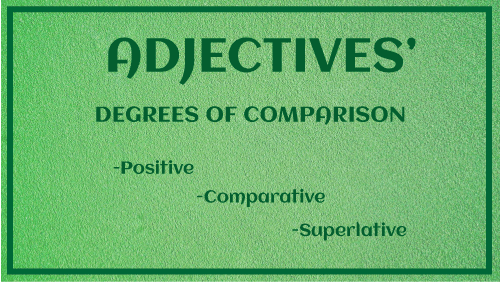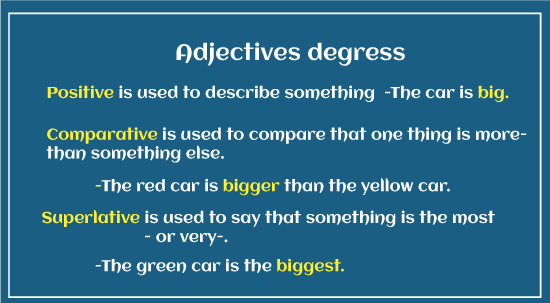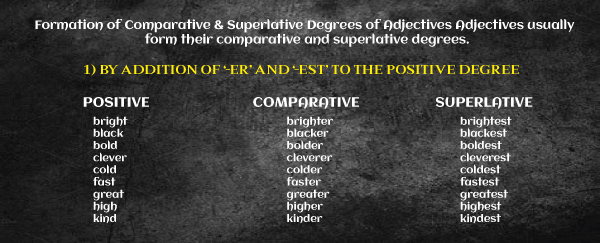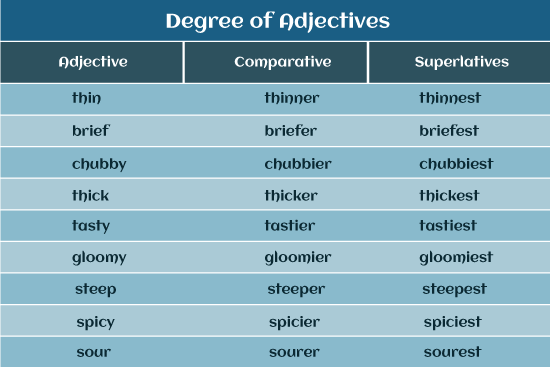Degrees Of AdjectivesWhat Are Adjectives?Adjectives are words utilized to describe, identify, modify, or quantify nouns or pronouns. Adjectives, in general, provide extra information about a noun or pronoun by describing or offering more information about it. For instance, the term humorous is used to describe something that makes others laugh. Some more examples of adjectives include- happy, sad, beautiful, tall, fat, gorgeous, gloomy, bright, black, crooked, smooth, etc. Adjectives have 3 degrees that help in comparing one thing to another. These degrees of adjectives help in expressing the intensities of adjectives in increasing orders. 
The three degrees of adjectives include;
Read on to know more about these degrees of adjectives. Positive DegreeThe notion of positive degree is the easiest to understand in the English Grammar. In contrast to the comparative or superlative degree, the positive degree is the basic, standardized, and uncompared variant of an adjective in English grammar. Also known as the absolute degree or the base form. For instance, in the phrase "the small reward," the adjective small is in the positive degree (the form present in a dictionary). Smaller is the comparative version of big; biggest is the superlative version. So hence positive degree is one of the degrees of adjectives that is the base form and only expresses the existence of the quality. Some of the examples of Positive Degrees of Adjectives are;

Comparative Degrees of AdjectivesThe comparative degrees of adjectives are used to demonstrate a feature or trait of one entity (noun or pronoun) in relation to the other (only one thing). These Degrees of Adjectives are those that compare one noun to the other. Comparative degrees usually end in 'er' and are accompanied by the words 'than' or 'to'. Also, the comparative degree is formed by adding the term "more" preceding the adjective in some cases. When an adjective is employed to compare two nouns/pronouns, it is usually in the comparative degree. Two items or objects are being compared in this case.
Noun(subject)+ verb+ comparative adjective+ than+ noun(object)
Some of the examples of comparative degrees of comparison are;
Whereas for certain adjectives word "to" is employed. Like words senior, junior implies to the comparison of the official ranking of two individuals, so in such a case, to is used. Also, in the case of superior, inferior to is used as these terms are used for comparing qualities between two items. Read on to know some of the instances of this case;
Superlative Degrees of AdjectivesThe superlative degree of an adjective describes a feature or trait of one object (noun or pronoun) in comparison to numerous other things (many things, more than one). It compares one thing to a plethora of others. The superlative degree showcases a thing's utmost intensity (quality or quantity) in relation to numerous other aspects (not one but more than one). A superlative adjective indicates that one thing outperforms all others in terms of property, attribute, or quantity. After a superlative degree in the sentence, words like "of" and "in" are employed. Also, make sure ; article "the" should be used before the superlative degree when changing a specific word. There are two ways to make a superlative:
Noun(subject)+verb+ the + superlative adjective+ noun (object) Some of the examples of superlative degrees of adjectives are;

Rules Of Degrees Of AdjectivesRule 1. When comparing two things or individuals, a comparative degree is employed by adding 'er' to the adjective term in conjunction with the term 'than.' In some circumstances, the word 'more' is employed. Example of a comparative degree:
Similarly, when comparing more than two objects/ individuals, the superlative degree is utilised by attaching 'est' to the adjective term or, in certain cases, 'most'. Examples of superlative degree of comparison are as follow:
Rule 2: When comparing qualities of a singular item or individual, use 'More.' Even if the initial adjective is only one syllable. Examples of degree of comparison are: Incorrect - Jane is smarter than witty Correct - She is more intelligent than witty. Rule 3: Avoid using double comparative or superlative adjectives. Instances of the degree of comparison: Incorrect - These pineapples are more juicier than those. Correct - These pineapples are juicier than those. Rule 4: Never use 'more or most' with absolute meaning adjectives. Example of the degree of comparison: Incorrect - This path is more aligned to that one Correct - This path is aligned, and the other is not. 
Rule 5: A few adjectives are followed by 'to,' such as senior, junior, superior, inferior, preferable, prefer, elder. When using these adjectives, do not use the word 'than.' Degree of adjective instances: Incorrect: I am more senior than kate. Correct: I am senior to her. Incorrect: This car manufacturer is superior than that. Correct: This car manufacturer is superior to that. Rule 6: When comparing two items, there should be some degree of similarity, i.e., similar or equivalent objects should be compared. Degree of comparison examples: Incorrect : This wall shade is more appealing than the old one. (The shade of the walls is compared with the walls) Correct : This wall shade is more gorgeous than that of the old one. (comparison of wall shade with previous wall shade) Rule 7: When the comparative degree is employed in the sense of superlative degree, utilize any other. When comparing two things or people from the same group, use 'any other'. Example of the degree of comparison: Incorrect: Riya is smarter than any trainee of her group. Correct: Riya is smarter than any other trainee in her group. If the comparison of things/people falls outside the group's scope, use 'any'. Incorrect: Chandigarh is tidier than any other town in Dhaka. Correct: Chandigarh is tidier than any town in Dhaka. Rule 8: When two adjectives with varying degrees of comparison are employed in the same statement, both must be complete in their own sense. Incorrect: Helen is as good if not worse than her sibling. Correct : Helen is as good as if not worse than her sibling. Rule 9: We employ quantifiers for the comparative degree of an adjective, such as to express if the distinction between the compared item or individual is minor or large (A bit, a little, a lot, far, much, a great deal, significantly, etc.). Example:
We don't employ quantifiers with superlative degrees of adjectives, but there are some phrases that are frequently used with superlative degrees of comparisons. Example of Degree of Comparison:
Rule 10: When modifying the degrees of comparison for irregular adjective, the term modifies altogether rather than addition of 'er' or 'est'. Examples:
Next TopicDemonstrative Adjectives
|
 For Videos Join Our Youtube Channel: Join Now
For Videos Join Our Youtube Channel: Join Now
Feedback
- Send your Feedback to [email protected]
Help Others, Please Share









